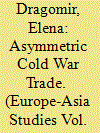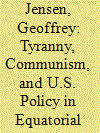| Srl | Item |
| 1 |
ID:
191768


|
|
|
|
|
| Summary/Abstract |
This article investigates Romania’s position towards the creation and functioning of the Generalized System of Preferences (GSP), with a special focus on its interaction with the European Economic Community (EEC). The period under investigation is limited to the 1970s, which was not only the first decade of the implementation of the GSP, but also a time of détente arguably favouring international cooperation and trade. This article argues that Romania did not conceptualise its foreign policy (economic foreign policy included) in terms of East against West, socialism against capitalism or command economy against free market economy but rather in terms of smaller states/powers against bigger states/powers and less developed (poor) countries against developed (rich) countries, regardless of their socio-economic systems and Cold War alliances.
|
|
|
|
|
|
|
|
|
|
|
|
|
|
|
|
| 2 |
ID:
167840


|
|
|
|
|
| Summary/Abstract |
This study of Washington’s dealings with Equatorial Guinea under the rule of one of modern Africa’s most brutal dictators, Francisco Macías Nguema, analyzes US perceptions and policies relating to communist intervention, human rights, and related geopolitical issues during the Nixon, Ford, and Carter presidencies. It also sheds light on the relationships and conflicts between the Soviet Union, China, and Cuba in Africa. In addition, it offers new perspectives on Cuba’s close ties to the dictatorship of Francisco Macías Nguema and on the possible role of international actors in his downfall in 1979.
|
|
|
|
|
|
|
|
|
|
|
|
|
|
|
|